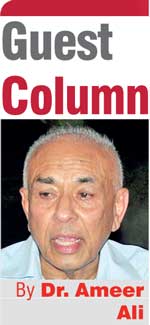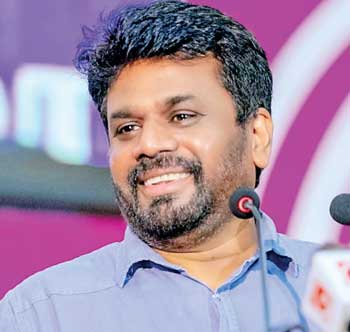Monday Feb 16, 2026
Monday Feb 16, 2026
Saturday, 24 August 2024 00:04 - - {{hitsCtrl.values.hits}}
NPP’s system-change and economic reforms minus a few populist promises ensure a modestly achievable target for a country caught in poly-crisis in comparison to the undeliverable and dreamy paradise guaranteed by its opponents. But the question is whether the guardians of the old order would allow NPP to cross the line. There are also foreign powers with vested interests observing closely local developments
 The Presidential election on 21 September 2024, if allowed to take place peacefully as scheduled, would be one like no other, because it is not simply going to be a choice among 39 individuals, which itself is a record, but more than that it will be a contest between two orders or systems and between two generations. It would present voters an opportunity to decide whether to retain a political culture and its associated system of governance, which is notoriously prone to nepotism, corruption and nonaccountability or to throw away that culture and lead this multicultural polity along the path of a reformed democracy based on a new constitution and devoid of any ethnonational or religious bias.
The Presidential election on 21 September 2024, if allowed to take place peacefully as scheduled, would be one like no other, because it is not simply going to be a choice among 39 individuals, which itself is a record, but more than that it will be a contest between two orders or systems and between two generations. It would present voters an opportunity to decide whether to retain a political culture and its associated system of governance, which is notoriously prone to nepotism, corruption and nonaccountability or to throw away that culture and lead this multicultural polity along the path of a reformed democracy based on a new constitution and devoid of any ethnonational or religious bias.
The need for this choice is no doubt the crave of a politically awakened young generation which, having witnessed during its lifetime the simultaneous erosion of economic prosperity and disciplined governance in this country rose in revolt in 2022 to demand system change. Thus, the forthcoming election provides an opportunity not simply to choose an individual but to decide whether the country continues with its old order or opts for a new one.
Among the 39 contenders, of whom a vast majority have entered the race not to win but to prevent the one they hate from winning, only three have any chance of crossing the line: sitting president Ranil Wickremesinghe (RW) who claims to be a neutral candidate with UNP label, Sajith Premadasa (SP) of SJB and Anura Kumara Dissanayake (AKD) of NPP. Among the three, the first two have nothing to say about system change, but with undeliverable economic promises employ every tactic available in Sri Lanka’s electioneering dictionary to attract voter support. But the third has made a firm commitment from the beginning to change the political culture of this country and he is promising to achieve it through a social revolution. His is a radically different manifesto reflecting the demands of a new generation. His economic focus also differs from what the other two are offering.
 |
| In contrast to RW and SP, AKD stands tall on the issue of system change |
A proven failure in politics
RW, the most senior of the three is a proven failure in politics who became a president by accident. Although he owes his presidency to the Aragalaya youth, he was the one who thanklessly turned against them and ended their historic revolt no sooner he was enthroned. RW was schooled in the politics of his grand uncle JR, who introduced the executive presidency on the ideological platform of Sinhala-Buddhist supremacy. JR disliked making political deals with leftists and ethnic minorities, and his system of proportional representation was to ensure that parliamentary democracy would always operate in the primary interest of the majority community. In a sense, several of the problems with which the country is currently grappling could be placed at the door of JR’s presidency.
On the contrary, RW is proving to be a deal maker and prepared to make deals even with the devil to win this race. He is a beneficiary of the existing system and wouldn’t dare changing it. His campaign is therefore dominated by what he calls as economic achievements, which simply means that he was the one who invited IMF to take charge of economic reparation and decided to follow scrupulously its reform agenda. The two budgets which he prepared as Finance Minister were based almost entirely on IMF’s direction. True, there had been a degree of economic stability and growth achieved largely through CBSL’s tough monetary policy and capital control, higher indirect taxes and severe belt tightening imposed on middle and low-income earners. But still poverty rate is remaining stubbornly high at around 23 to 25%.
This according to RW is unfortunate and he wants the sufferers to wait until 2048 to bask in his economic paradise. His entire political campaign is therefore dominated by two features: scare mongering about a possible return of the dark past under a different president and tantalising the masses with undeliverable promises like Rs. 25,000 increase in salaries to all public servants and higher basic wage for the plantation workers. Even IMF would be alarmed at such promises, which would sabotage its strategy for fiscal consolidation. IMF is also insisting on serious reforms to improve governance, but RW is understandably silent on this, because such reforms would remove the leverage the system has for political survival.
Nothing original to contribute
The second of the three, SP, has nothing original to contribute for a better future. The campaign by him and his lieutenants is almost entirely concentrated in attacking RW’s tax measures and their adverse impact on the poor. They promise to renegotiate with IMF to reduce the tax burden without rebalancing it, and like RW, they too believe in the magic of foreign investment and high technology to achieve economic prosperity. At least RW has a timeline to reach his goal, but this group doesn’t have any. Also, on what specific areas that foreign investors should be encouraged to invest and what would happen to the stock of labour and skill made redundant through high-tech industries are issues left unexplained.
SP too is silent on system change, because like RW, he is also a beneficiary of the prevailing political culture. Hectic cross overs from party to party and hasty deals with business minded ethnic and factional groups are an index of the extent of leverage that current political culture permits. Why then should he change it?
Stands tall on system change
In contrast to RW and SP, AKD stands tall on the issue of system change. As pointed out he and his NPP have declared categorically that they would transform the political culture of this nation through social revolution. In layperson’s language it means clean governance with accountability, an essential ingredient to any level of economic success. NPP has also promised to bring to books those who were responsible for causing the economic disaster which left with no alternative but to invite IMF. This political determination has sent jitters within his opponents’ camps and hence their vicious propaganda against AKD and his NPP. These propagandists are not criticising NPP’s program as such but engaging instead in scaremongering by reminding voters of JVP’s bloody past when AKD and his colleagues were not even teenagers. To the critiques of NPP history remains static.
On the economic front also NPP has a different focus but with a commitment to renegotiate with IMF. Unlike SJB’s renegotiation NPP’s focus is not only about taxes but also about alternative strategies to redirect resources to strengthen the local production sector. This makes lots of sense given the current economic turbulence causing inflationary pressures, rising cost of living and sliding growth rates in developed economies. Sri Lanka’s apparel exports are already facing declining demand due to this turbulence.
Unlike RW’s and SP’s views about an open economy AKD’s imply structural changes. This contributor had already published a piece in this journal on China’s bird cage economic model. It was through that model China eventually emerged as an open economy and world’s second economic powerhouse. NPP’s economic reforms seem to follow that path. With structural changes even IMF reforms would deliver better and lasting results to the economy.
In sum, NPP’s system-change and economic reforms minus a few populist promises ensure a modestly achievable target for a country caught in poly-crisis in comparison to the undeliverable and dreamy paradise guaranteed by its opponents. But the question is whether the guardians of the old order would allow NPP to cross the line. There are also foreign powers with vested interests observing closely local developments. US, China, India and Israel for various reasons must be closely watching the winning prospects of their favourable fighter in the ring. Nothing is certain until the election takes place as scheduled. From all count it is going to be an election like no other.
(The writer is attached to Business School, Murdoch University, W. Australia.)